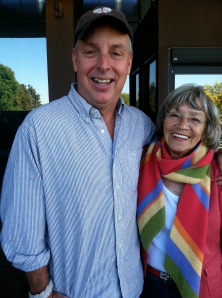
I just finished performing at the Forest Storytelling Festival in Port Angeles, WA, and had a great time. The other tellers were all very good (Lyn Ford, Robert Greygrass, Will Hornyak, and Alison Cox) and we complemented each other very well and had a great time. And while I was busy, I got out before the festival started and took a nice hike up Hurricane Ridge where I only got a little wet. The Northwest, you know. Picture above – it was really raining when I took the picture.
The stories were good, but I am thinking a lot about what happened in the workshop I gave before the festival started. I did a 2 ½ hour workshop on personal stories (anathema to all the European tellers, and those who are sick of hearing people talk about themselves). I talked a lot about trying to place a personal story in the context of myth so it would have resonance. That’s all good, but I also talked a lot about imaging – seeing the story in the mind’s eye – which I have considered essential to good storytelling. It’s how I work, and how I teach. But that’s where I ran into trouble.
One of the workshop participants, who has been telling stories for a long time, told me that he doesn’t see stories – he doesn’t have pictures in his head. I have run into this before, and usually have found a way around it. I have ways of tricking people into admitting they have pictures in their heads when they tell stories. It’s how I operate, and I suspect how most tellers, or writers (and certainly filmmakers) operate. I usually can get them to admit that they do.
But this one wasn’t budging. No, he insisted, he didn’t see anything, he just told the story.
I was confronted with a problem. I didn’t get it. As a workshop leader, I am supposed to know everything. He was messing up my workshop. And he wasn’t going along with my tricks. I was trying to get on to the next point, but here I was, with an embarrassing moment.
So I said (essentially), “Wow, I don’t get this. I believe you but I don’t get this. You see, or do things differently from me, and I don’t get it, and I don’t know what to say.”
I was confronted with a way of being that I did not understand, and I gave up and admitted it. “Seeing” the story is essential to my work, and I considered it universal, but here was someone saying there was another way to do it.
Rather than tell him he was wrong, I just said, “Okay with me – I need to understand it.”
After the workshop, he thanked me for affirming that his way of doing things was valid – he said it was the first time a workshop leader had done so. All I had said was “I don’t get it. I don’t understand it, but what do I know?” Who knows everything? Another workshop participant, a psychologist, came up to me and said that there’s a number of ways to experience things – it could be visual, but it could also be auditory, or it could be affectively – the emotions in the experience might give you the path towards finding the words. And afterwards, I thought about how smell or touch could do it, too. Diane Ackerman’s sensational (ha ha ha) book A Natural History of the Senses talks about this and suggests that smell is the strongest sense when it comes to dwelling in memory. Could you tell a story about your grandmother baking bread without having any images in your head?Well, evidently, even though I don’t know how.
Over the weekend, I had several conversations with my non-visual storyteller. At one point, he said he tried to feel what was going on in the story, and operated from that perspective. I understood that. My stories often start with a feeling that I would like to elicit – one I’ve had and want to evoke. And then, a day later, he told me that he was working on a new story and that morning he had tried to picture it and for a few fleeting seconds, he could see it happening in a way he hadn’t before. It was a small breakthrough. I think if I had just told him he was wrong, he would not have done that.
It got me thinking about what a visual culture we are – we are addicted to images, often at the expense of the other senses, which might provide a deeper experience.
This process is all very interesting to me. I take away at least two things from the experience.
First – I’m a better teacher when I admit that I don’t know everything. Teachers spend so much time trying to have all the answers, it’s very difficult to admit when they don’t. But when they do (or in my case, are forced to), something else happens. We can go deeper into the experience of learning – it’s a wide open space with no easy answers, and kind of uncomfortable. But it’s also very liberating.
Second, I was forced to recognize that there are ways of being that I do not really understand. This is a very humbling experience, especially for someone who professes to be an expert. I am a moderately synaesthetic person – music has colors to me, words evoke feelings, visual things may evoke smells – but there is still a lot that I just don’t get. It’s a big world, and I only understand a little part of it. I should shut up and pay more attention.
I said to my non-seeing workshop participant that I suspected the more we could draw on all of our senses, the better off we would be in our work. He may, in the long run, gain from his attempts to “see” stories in a way he never has before. It will probably make him a better storyteller. And I should probably be more willing to admit that someone understands the world differently than I. It will make me a better workshop leader, and maybe more than that.
What drives your creativity? Something else than image?
Read Full Post »






